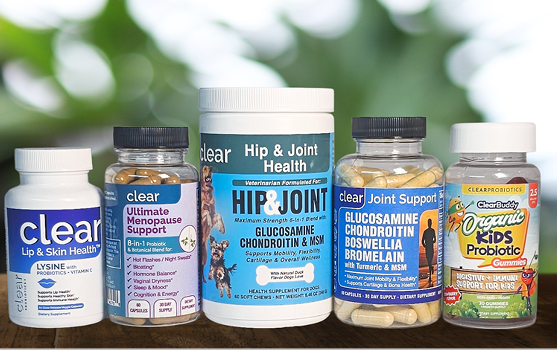Vitamin C
Vitamin C
Understanding The Health Benefits of Vitamin C
If you’ve been sick lately, there’s advice you’ve likely heard over and over again: get lots of rest, drink plenty of water, make sure to get more Vitamin C. It’s advice that makes sense - just like chicken soup, Vitamin C has become synonymous with health. But why vitamin C, why not any of the other vitamins?
While our bodies rely on an entire alphabet of vitamins to keep us healthy - and plays roles in everything from digestion to blood clotting [1] - one of the most important vitamins we rely on is vitamin C. Also known as Ascorbic acid, Vitamin C is a powerful antioxidant that is important in recovering from infections, is a required vitamin to make collagen, and can even possibly slow or stop the development of cancers[2,3].
With its powerful antioxidant properties and importance to collagen production, Vitamin C is vital to immune health and healthy skin.
The Clear Story of Vitamin C
Have you ever heard of something called scurvy? Before Vitamin C’s discovery as a vital component to your body, scurvy was a common disease in the world’s navies, estimated to have affected around 2 million seafaring people in the past few centuries. Scurvy would cause hair loss, weakness and bruising skin, mental apathy and swollen legs and if left untreated could cause the patient to die [4,5].
In 1753 a then-unknown man named James Lind, fresh from his enlisted career with the Royal Navy published a book titled A Treatise of the Scurvy. According to the Treatise Lind conducted medical trials that reportedly took place in May of 1747 while at sea in the English Channel. His trial involved twelve sailors, all diagnosed with scurvy, treated in the same quarters and given the same diet - a diet which included two oranges and one lemon daily. The sailors all made surprisingly fast recoveries and one was even back fit for duty after just a few days of illness [6].
Thanks to James Lind’s trials, modern medicine now knows that scurvy is caused by a deficiency in Ascorbic acid otherwise known as Vitamin C, a natural vitamin found in citrus fruit and other foods [5].
Benefits of Vitamin C
Thankfully now most of the world has access to adequate nutrition and diseases like scurvy are a thing of the past, but that doesn’t mean science has stopped. Advances in modern medicine have removed many diseases from our minds and are highlighting more of the exciting benefits of simple vitamins like vitamin C.
One of the most popular benefits is of course its cold-fighting powers. Vitamin C has been shown to decrease the length and severity of a cold, and taken at the onset of a cold could ease symptoms [2]. The vitamin can even help those suffering from anemia by helping increase iron absorption [2,13].
Vitamin C’s roles in the immune system are many and extremely important, aiding in everything from removing harmful microbes to enhancing B and T cell count. Especially important in this era, Vitamin C also seems to aid in prevention and treatment of systemic and respiratory infections [15].
Vitamin C is also an extremely potent antioxidant. Antioxidants are substances that protect cells from being damaged - they play a huge role in preventing DNA from being damaged by free radicals. Free radicals themselves are harmful and unstable particles that can damage your DNA leading to diseases or even cancer [7].
When compared to other antioxidants Vitamin C completely protected the fatty membranes of cells from peroxidative harm leading researchers to conclude that Vitamin C is a vital antioxidant for protection against degenerative processes and disease [8].
Finally, because Vitamin C is required for collagen to synthesize [3] it is extremely important for keeping healthy skin. Collagen is present in all connective tissues in your body giving them structure; in your skin collagen keeps your skin strong and elastic, which in turn keeps your skin looking clear and wrinkle-free [11].
Going past just the skin's deep appearances, because collagen is present in all connective tissues like organs, muscles and cartilage, increased Vitamin C has shown to be beneficial in wound healing. Two clinical studies reported scar tissue and collagen fiber formation increased when given Vitamin C compared to the control group without the vitamin [12].
How is Vitamin C Used
Vitamin C deserves more publicity, especially when reading its long list of impressive health benefits. From keeping skin healthy to speeding up wound healing, from its antioxidant properties to being able to treat anemia - Vitamin C is impressive and relatively safe. While keeping in mind that anything can be bad at high enough concentrations, because Vitamin C is water soluble, taking too much of it means the excess will just be harmlessly excreted at your next bathroom trip [2].
Some of the best sources of Vitamin C are surprising, since oranges and lemons are not at the top of the list [14]. Some of the best sources of Vitamin C are:
- Guavas
- Kiwifruit
- Bell Peppers
- Strawberries
- Oranges
Vitamin C is also easily found in a concentrated form: Ascorbic acid. Ascorbic acid can be found as a powder or in supplements such as the Clear Probiotics Lip & Skin Health supplement.
Why Clear Probiotics Utilizes Vitamin C
Adding Vitamin C as a supplement to your diet brings many benefits without any drawbacks. Vitamin C promotes and directly supports healthy skin and a healthy immune system while aiding in healing and prevention against diseases. Clear Probiotics chooses to use Vitamin C in its supplements because it has such a clear history of safe, beneficial use. Though its cancer fighting potential is still being debated and studied by doctors and scientists, Vitamin C is proven to be a powerful antioxidant.
The Science and Research Behind Vitamin C
Harvard School of Public Health Nutrition Source: Vitamin C
An informative read, this article provides a lot of information on Vitamin C, its history and answers a lot of common questions like how Vitamin C helps with the common cold.
Vitamin C Fact Sheet for Health Professionals
A bit of a dense article but provides a lot of evidence for and against popular misconceptions around Vitamin C. This article shows how Vitamin C has been shown to reduce the chance of cancer, but also cites other studies that prove otherwise.
Ascorbate is an Outstanding Antioxidant in Human Blood Plasma
This study investigates how Vitamin C, as an antioxidant, performed better than other antioxidants in preventing damage to cells.
A great resource if you are wondering what antioxidants are and how free radicals can harm your cells.
Resources:
- U.S. Department of Health and Human Services. (n.d.). Vitamins and minerals for older adults. National Institute on Aging. Retrieved June 21, 2022, from https://www.nia.nih.gov/health/vitamins-and-minerals-older-adults
- Vitamin C. The Nutrition Source. (2021, May 27). Retrieved June 21, 2022, from https://www.hsph.harvard.edu/nutritionsource/vitamin-c/
- U.S. Department of Health and Human Services. (n.d.). Office of dietary supplements - vitamin C. NIH Office of Dietary Supplements. Retrieved June 21, 2022, from https://ods.od.nih.gov/factsheets/VitaminC-HealthProfessional/
- KJ;, C. (n.d.). The discovery of Vitamin C. Annals of nutrition & metabolism. Retrieved June 21, 2022, from https://pubmed.ncbi.nlm.nih.gov/23183299/
- JH;, B. (n.d.). Sailors' scurvy before and after James Lind--a reassessment. Nutrition reviews. Retrieved June 21, 2022, from https://pubmed.ncbi.nlm.nih.gov/19519673
- Milne, I. (2012, December). Who was James Lind, and what exactly did he achieve. Journal of the Royal Society of Medicine. Retrieved June 21, 2022, from https://www.ncbi.nlm.nih.gov/pmc/articles/PMC3536506/
- U.S. Department of Health and Human Services. (n.d.). Antioxidants: In depth. National Center for Complementary and Integrative Health. Retrieved June 21, 2022, from https://www.nccih.nih.gov/health/antioxidants-in-depth
- BN;, F. B. E. L. A. (n.d.). Ascorbate is an outstanding antioxidant in human blood plasma. Proceedings of the National Academy of Sciences of the United States of America. Retrieved June 21, 2022, from https://pubmed.ncbi.nlm.nih.gov/2762330/
- Wojciechowski, C. N., Wojciechowski, C. N., 17, S. J. M. S., 17, E. H. S., & Mia Rose Del Nunzio September 17. (2015, September 17). SIOWFA15: Science in our world: Certainty and controversy. SiOWfa15 Science in Our World Certainty and Controversy. Retrieved June 21, 2022, from https://sites.psu.edu/siowfa15/2015/09/17/will-breathing-be-the-death-of-you/
- B;, C. A. C. F. (n.d.). Toward a new recommended dietary allowance for Vitamin C based on antioxidant and health effects in humans. The American journal of clinical nutrition. Retrieved June 21, 2022, from https://pubmed.ncbi.nlm.nih.gov/10357726/
- Kaputk. (2022, January 20). Do collagen peptides actually work? Cleveland Clinic. Retrieved June 21, 2022, from https://health.clevelandclinic.org/what-do-collagen-peptides-do/
- DePhillipo, N. N., Aman, Z. S., Kennedy, M. I., Begley, J. P., Moatshe, G., & LaPrade, R. F. (2018, October 25). Efficacy of vitamin C supplementation on collagen synthesis and oxidative stress after musculoskeletal injuries: A systematic review. Orthopaedic journal of sports medicine. Retrieved June 21, 2022, from https://www.ncbi.nlm.nih.gov/pmc/articles/PMC6204628/
- He H;Qiao Y;Zhang Z;Wu Z;Liu D;Liao Z;Yin D;He M; (n.d.). Dual action of vitamin C in iron supplement therapeutics for iron deficiency anemia: Prevention of liver damage induced by iron overload. Food & function. Retrieved June 21, 2022, from https://pubmed.ncbi.nlm.nih.gov/30272083
- Whitbread, D. (2022, May 10). Top 10 foods highest in Vitamin C. myfooddata. Retrieved June 21, 2022, from https://www.myfooddata.com/articles/vitamin-c-foods.php
- Carr, A. C., & Maggini, S. (2017, November 3). Vitamin C and immune function. Nutrients. Retrieved June 21, 2022, from https://www.ncbi.nlm.nih.gov/pmc/articles/PMC5707683








